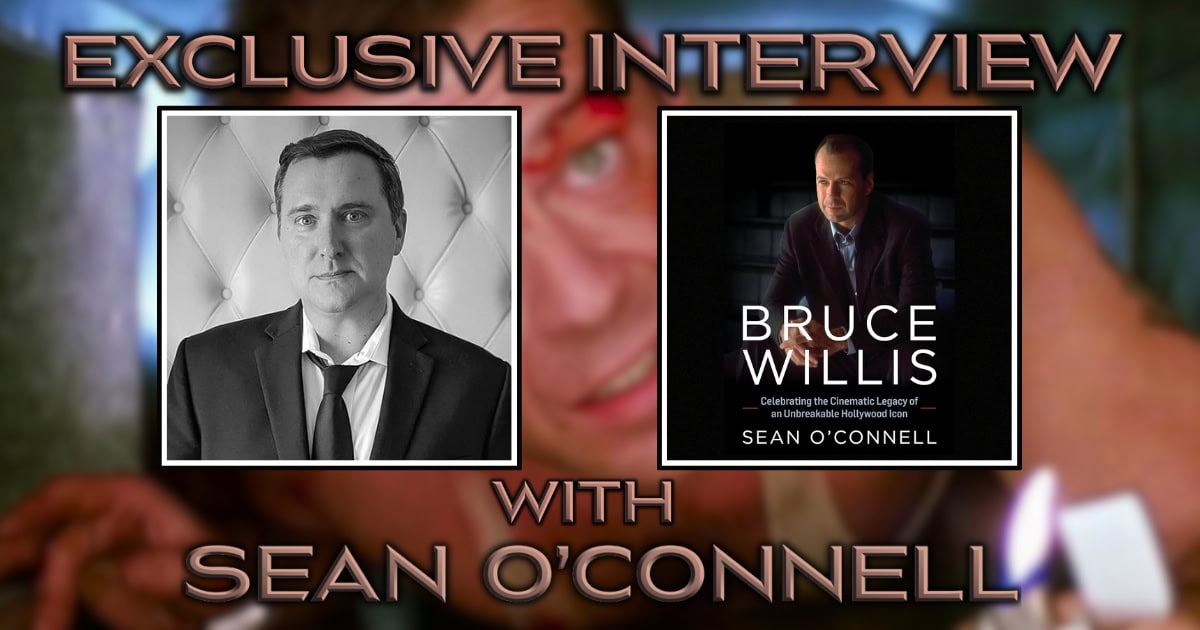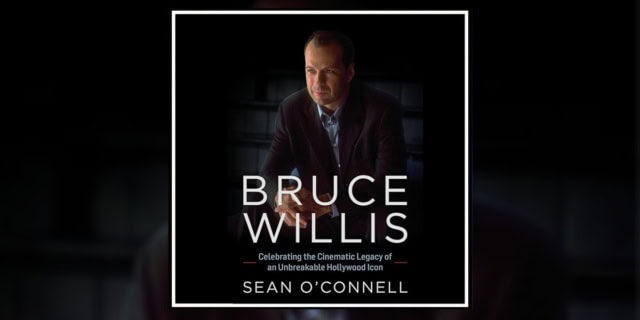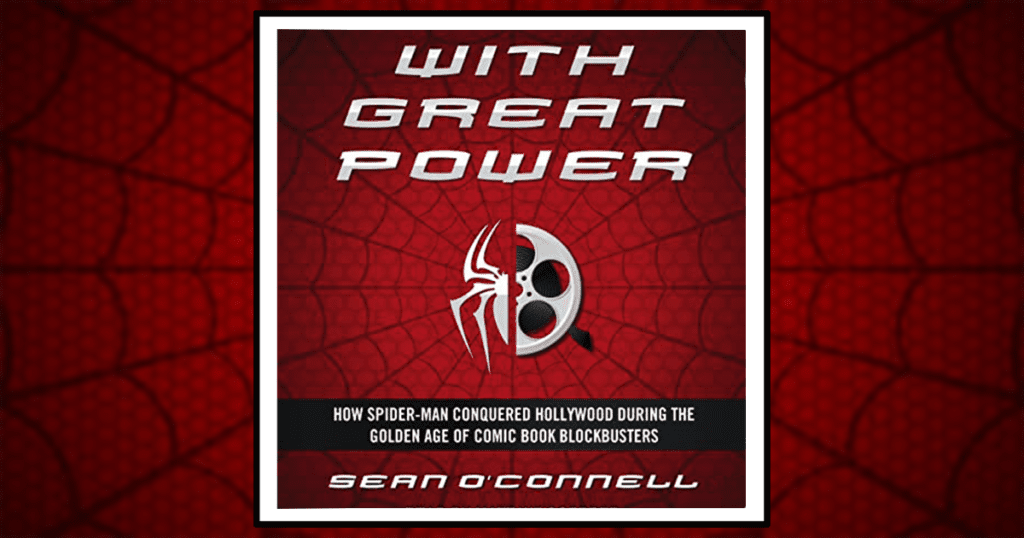How did you pick the Bruce Willis to be your next subject after your Spider-Man book?
Sean O’Connell: So I am a die hard comic book fan. I love superhero movies. That’s my favorite genre of film. It’s kind of crazy that I, you know, I’ve been lucky enough to be a professional film writer during a time when it seems like Marvel and DC were kind of at the top of their game; and even now, when it seems like each of them are going through a period of change…I fully expect each of them to be back up and running at full strength within the year or so, especially with what James Gunn is going to launch and, you know he’s not going to let Marvel spin too far out of control.
But after doing those two books, and really the Snyder Cut one felt like it was a breaking news story, like as it was happening, because I was kind of researching that, that online movement, and the work that they were doing to get the cut released, and there was a lot of urgency too, you know, were they going to succeed? How far were they going to keep pushing it? A lot of people who thought that they should stop, Zach sort of continuing to egg them on and tell them no, keep pushing for it. And then before that book, before I was able to finish writing it, HBO Max kind of decided that they were going to release the final cut. So that was very much a work that was coming together as all the stuff was happening.
And then with Spider-Man, I knew I wanted to take over something that was like a controlled amount of time, and really go from like the earliest beginning history of Spider-Man through No Way Home, which is all three of them kind of coming together under the banner.
And so for the next for the third book, I knew I wanted to go a little bit bigger, but then didn’t realize how big Bruce Willis career was. He has a lot of movies, 115 different movies, but I’ve always loved him. He’s been one of my favorite actors of all time, like, I love the first die hard film that has been my go-to answer of my favorite movie of all time, from when I was a kid and I got to see it for the very first time. I loved the career choices that he made over the years and the different directors that he wanted to work with.
So I knew I wanted to do something about him. I just didn’t know what. And it was when he announced his retirement and said that he was, you know, going to stop acting, that I thought, ‘Okay, this is a good time for me to sort of take his career as a whole and try to figure out and then explain to people why I think he matters, like why he’s important to film history.’ And the idea of the movie star, you know, the idea of the A Lister, which you know isn’t really much of a thing anymore, although it’s starting to come back. We’re starting to see people like Glenn Powell, you know, Emma Stone, they’re starting to bring back celebrity.
On the structure of the book and using eras of Bruce Willis’ films to make it more accessible to fans.
Sean O’Connell: Well, I really wanted this book, and I want this book to be the type of book where someone could pick it up, they could skip right to the chapter of the movie that they’re interested in because, you know, you’re probably going to have a favorite Bruce Willis movie if you’re picking this book up, and you’re going to want to see what I have to say about it. But also maybe, you know, you might learn about one that you haven’t seen yet. And so I want people to be able to, like, stop, go find the movie on a streaming service or on a DVD, put it on, watch it, and then go back and read what I had to say about it.
The Spider-Man one. It definitely was a series of stories, but I wanted to kind of continuously prove that, like with each stop along the way, this is what people were learning about how to do Spider-Man movies and Raimi had to figure out so much from the very beginning. And because he was the first one to really try it. And then Mark Webb almost had to completely reinvent because he didn’t want to copy Sam Raimi. And then Marvel getting their first swing, you know, at doing Spider-Man and making sure that he was as young as possible. There was still like lessons being learned.
But the Bruce one, I want people to be able to come in and out of the book as much as they want to and go enjoy a couple of his movies, and then come back and back into the chapter and see what I had to say about it. And, you know, disagree with me as much as you want, and, you know, send me hate mail and stuff like that.
Would you agree that Bruce Willis was in the center of making those genres what they are today? Like defining the genre in a way?
Sean O’Connell: You know what’s interesting? Because I think he’s best known for the action genre, but I feel like action movies today wouldn’t know how to use him. And I’ll use an example of The Rock [Dwayne Johnson]. The Rock is the antithesis of Bruce Willis. Bruce Willis is a blue-collar guy, you know, a regular guy who can be hurt, who can bleed, who you don’t really know if he’s going to make it to the end of the movie. And The Rock is a machine, you know. And he has to, he and Jason Statham have to negotiate who gets hit more times, you know, in a movie. So, the action genre, yes, I think Bruce was really important to it back in his day. But it’s different now. You know, it’s a different type of storytelling, and I hope we get back to the storytelling where we could relate with the hero who’s on-screen.
You know, speed is another great example of Keanu Reeves wasn’t a superhero in that movie, you know, he’s a regular guy who’s doing the right thing. That’s all stems from the Bruce Willis model. But, but somewhere along the way, the action and maybe superheroes did this. Superhero action movies became the action hero had to become larger than life, and that wasn’t Bruce. So maybe Bruce’s influence was more in the Science Fiction genre because of the things that he tried with Luc Besson in The Fifth Element, or Terry Gilliam for 12 Monkeys. You know, you see that smarter, idea-driven science fiction more on television, you know? Films like, shows like, 3 Body Problem or something like that on Netflix. I think Bruce, if he were still acting today, if he was in his prime, he would thrive in a streaming series, you know, that that was really pushing the envelope. But maybe like silo with Rebecca Ferguson or something like that, something with really big ideas.
What do you hope people take away from your Bruce Willis book?
Sean O’Connell: I hope the book helps people better appreciate his contributions, you know, I hope that people because I do think most audiences just sort of think of him in the action genre. And I understand that, you know, that’s where his biggest movies lie. But you know if you go back over that index, you know, at the end of the book, and you see all the titles are there and the different things that he tried, I just don’t know if we have actors who are doing the things that he did. I’m not sure that there’s a comparable person that’s matching what he did. So I wanted to make sure I celebrated that.





